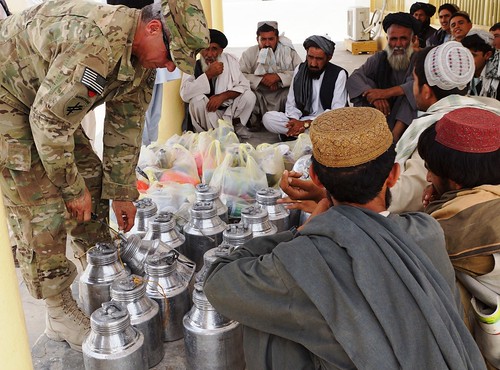Story and photos by Sgt. Paul Evans, KY ADT 4 Unit Public Affairs and Historian Representative
[caption id="" align="alignright" width="400"]

Capt. David Liciardello of Belmont, Va. prepares to distribute milk sterilization supplies in southern Afghanistan on July 5, 2012. The tools were provided at the conclusion of a dairy training program which Kentucky’s Agribusiness Development Team 4 helped local Afghan officials design and coordinate. (U.S. Army photo by Sgt. Paul Evans)
FORWARD OPERATING BASE PASAB, Afghanistan -- Got milk? In America, the slogan serves as a simple question posed in efforts to remind people to pick up a gallon at their local grocery store. But in southern Afghanistan, things aren’t always so simple due to a nonexistent economy from decades of war and a lack of resources and education to produce healthy, pasteurized milk.Seeing a need, the Kentucky National Guard’s Agribusiness Development Team 4 took the challenge of helping locals in Zharay District, Kandahar Province develop skills to process their milk. While still not quite up to quality levels expected, the education at least trained Afghans on how to remove detrimental diseases.
“There’s a certain need, and the desire came through from the District Agriculture Extension Agent,” noted Capt. David Licciardello, a 54-year-old Belmont, Va., resident, who serves as ADT 4’s Veterinarian Advisor.
“Dairy is an important part of the (Afghan) culture, as well as nutrition,” he added. “The milk here is not processed, so there’s a large amount of disease transferred, particularly to children. Brucellosis is the big thing.”
“It (brucellosis) affects multiple organs, heart, joints,” Licciardello described. “It’s sort of an insidious disease, and it’s more difficult on the children, obviously, but it can affect anyone.”
[caption id="" align="alignleft" width="354"]

Kentucky Agribusiness Development Team 4’s Veterinarian, Capt. David Liciardello of Belmont, Va. speaks to local farmers in southern Afghanistan on July 5, 2012 following a six-day dairy training course intended to help farmers better clean their milk and take care of livestock. ADT 4 helped local Afghan officials design the training’s curriculum and coordinate its execution. (U.S. Army photo by Sgt. Paul Evans)
“What we’ve done is we’ve presented a class to people that produce dairy and given them methods of sterilizing milk and cleaning the cows,” Licciardello recalled. “Also, we trained them on treating some of the diseases that cows are prone to get, collection techniques so they can sell the milk to dairies and make a profit from it to expand their herd, proper nutrition of the cows, and husbandry. It was a six-day course of training to 20 Afghans.”“It made them (farmers) aware of the diseases that can be spread by unpasteurized milk. That was the big thing,” Licciardello said. ‘They were taught some methods of sterile collection and chemical sterilization so the diseases don’t spread to their children, at least.”
“Trainees were all given a small milk kit, collection cans, mastitis instruments, and sterilization techniques and tools,” he said. “So, they walked away with some things that would help them in their dairy production.”
“They’ve also been told how to feed their cows better so they get higher production, more milk, some breeding techniques, and how to increase their herd sizes. The affects should be fairly good here,” he added.
“What we’re also looking at is putting in a dairy production facility here in the (Zharay) District, so this was kind of getting a feel for how dairy farmers react to having a dairy right in their back yard. It was a very positive response. They’re looking forward to it.”
“All of the trainees were very encouraging and enthusiastic about the training,” Licciardello observed. “They’re also really happy to learn that they can make more money in profits from the milk and the prospect of having a dairy built here in the District.”
Based on the positive reaction and needs, Licciardello discussed plans to expand the training to other Districts within the Kandahar Province.
“We’ll probably try to do this in some other Districts because of the public health implications of milk-borne diseases,” he said. “And we also hopefully will move ahead with the dairy project here in Zharay (District), which will require further training.”
Licciardello also described some of what ADT was able to learn from students in their dairy training class.
“We actually gave them a survey form to fill out and it was all positive feedback,” he described. “They’d like to get more training. It was very enthusiastic feedback.”
[caption id="" align="alignright" width="300"]

Capt. David Liciardello (right) of Belmont, Va. helps Nicholasville, Ky.’s Staff Sgt. Chris Campbell (left) unpack milk sterilization supplies in southern Afghanistan on July 5, 2012. The tools were provided at the conclusion of a dairy training program which Kentucky’s Agribusiness Development Team 4 helped local Afghan officials design and coordinate. (U.S. Army photo by Sgt. Paul Evans)
“The information that we got, some of it was the amount of milk they could produce and requirements that they have. They need animal health workers, which they don’t have here. Kentucky ADT has sent two students to school to learn that, so they’ll come back here and help these guys, which they appreciate."“We’ve also learned that production of milk here is higher than what was originally thought, and that helps us with the planning for the dairy,” he added.
In the end, Capt. Licciardello described what meant the most about dairy training to him personally.
“I feel like we may have prevented some of the citizens here from becoming sick, having these very life-threatening diseases or chronic diseases being spread,” he said.
Thanks to the continuing efforts of ADT 4, it would seem that in the future, many more Afghan citizens will be able to say that they too have milk. Disease-free milk at that.